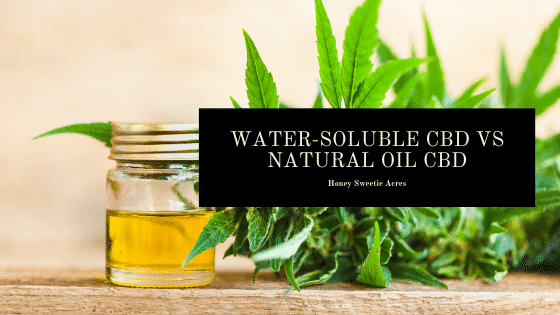We have been questions about Water-Soluble CBD VS Natural Oil CBD a lot lately.
There is a new trend in CBD that is being marketed as providing faster absorption and high levels of retained CBD by the body. The argument being made against natural Full-Spectrum Hemp CBD is that the oil version is unable to enter the bloodstream without enzymes breaking them down.
Where is the proof for Water-Soluable CBD?
What bothers me about this is there are no current studies about the proper dosing of water-soluble CBD. There is no “proof” that water-soluable is absorbed faster or that the efficacy in the body is greater. New technology can be great, but studies are needed to support the claims of absorbability and there simply are not any. At least not yet. But unfortunately, CBD brings out all sorts of claims and methodologies to market to the masses. There is so much confusion over CBD dosing, that it is irresponsible to tell people they can absorb even MORE. More isn’t always better. A base dose of 30 mg/ml per day has been established based on the latest oil research. Research is done in the interest of consumer safety.
CBD Studies focus on Natural CBD Oil
It is interesting to note that the CBD studies of real note have been on natural CBD oil. This is true even for Pet CBD, where only two studies have been conducted. One was at Colorado State University and the second was at Cornell University Veterinary School. These studies proved conclusively that positive, effective results were achieved for dogs and cats using the CBD natural oil. So the oil is obviously working without being converted to another form.
Calling CBD Oil “water-soluable” is, in my opinion, slightly misleading. It appears that the term is just being used to market another “form” of CBD to consumers and convince them to buy. Let’s look at exactly what it is.
What IS Water-Soluble CBD?
First, a water-soluble version has strictly been engineered in a laboratory. It is a patented process, so the full details cannot be obtained. However, what we do know is that the CBD oil is converted to a micro-size granular powder. The tiny pieces are then micro-encapsulated with a non-toxic binder so that it is shelf-stable. Curcumin is then added to CBD molecules to increase the water solubility. Since the compounds in hemp-derived CBD oil cannot dissolve, this process changes the base structure.
Research on CBD was stymied for many years because of the cannabis (marijuana) connection and prohibitions by the DEA (Drug Enforcement Agency). Even at this writing, only 13% of medical schools teach about the Endocannabinoid System! The doors are opening wide at institutions now and all this is changing.
So, I would like to see definitive research tied to the water-soluble cbd version. Until that is available, we will be sticking with the fractionated coconut oil and other tested carriers for our CBD.


